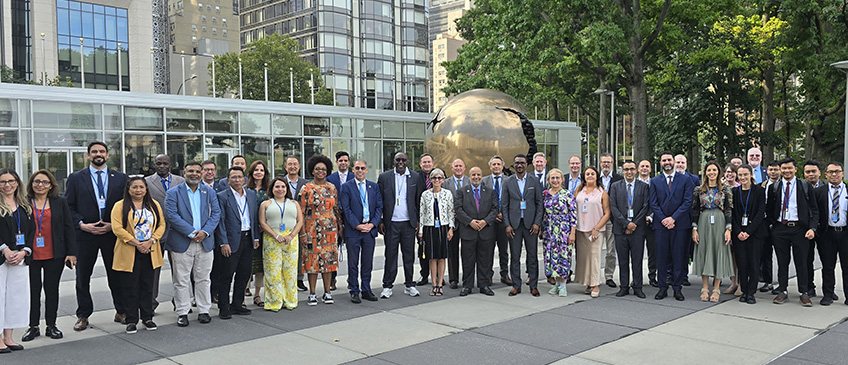On 22 July 2022, the Economic and Social Council (ECOSOC) adopted resolution 2022/24 which reiterated the importance of strengthening and enhancing the effectiveness of the UN-GGIM, particularly for the achievement of its operations focused on the SDGs and the UN-IGIF, to strengthen and ensure its continued effectiveness and benefits to all Member States. At its thirteenth session, in making decision 13/105, the Committee of Experts congratulated the High-level Group for its continued efforts to advance the role and relevance of the Integrated Geospatial Information Framework through a significant range of activities, including broadening work group membership, developing communication materials, a sustainable funding guide and an online tool, translating the Framework suite of documents, and participating broadly in webinars, workshops, conferences and events to promote and advance the Framework.
At the third plenary meeting of the High-level Group of the United Nations Integrated Geospatial Information Framework (HLF-IGIF), held on 22-23 January 2024 in Aguascalientes, Mexico, alongside the Expert Consultation and Meetings on Enhancing Geospatial Information Management Arrangements and Accelerating the Implementation of the SDGs. The HLG-IGIF reviewed and made recommendations on its Strategic Plan. Recommendations included to streamline, prioritize, reduce duplicated items within its goals, and considered contributions from the UN-GGKIC, the SDG Data Alliance and relevant functional groups and thematic networks of the Committee of Experts.
The Fourth plenary meeting of the HLG-IGIF was an opportunity for its Work Groups to discuss and present the proposed changes to their work plans based on the updated Strategic Plan. The HLG-IGIF reviewed the progress of the work groups, the proposed contributions by the United Nations Global Geospatial Knowledge and Innovation Centre (UN-GGKIC), the regional committees, and Member States in advancing the UN-IGIF. Participants welcomed the presentations and sharing of experiences across the different regions and noted that collaboration, partnership, dialogue, and communication are key to advancing the UN-IGIF and strengthening national geospatial capacity. Some Member States also shared their experiences, current work, accomplishments, and challenges advancing the UN-IGIF to address climate change, marine space, the SDGs and establishing SDG Data hubs. The event provided an opportunity to have an open and frank dialogue on synergies and duplication challenges, and further consider the need to increase alignment between the work and activities of the HLG-IGIF, International Advisory Committee of the UN-GGKIC, Regional Committees, the UN-GGKIC, and the SDG Data Alliance. The discussions helped to guide the finalization of the HLG-IGIF work plan, and to assume a more strategic approach that considers the additional resources anticipated from the UN-GGKIC and the Secretariat of the Committee of Experts later in 2024 Participants noted on several instances the importance of maintaining a thorough documentation on the UN-IGIF and beyond during the implementation to ensure that goals are achieved and to adapt to the evolving situation.
At this Fourth plenary meeting, the HLG-IGIF approved the draft Sustainable Funding Guide provide by its Sustainable Funding Work Group and agreed to subject the draft to further consultations, noted the need for sustainable leadership of respective Work Groups, commended the work related to the UN-IGIF Global Survey and highlighted the critical need for coordination of upcoming activities between the HLG-IGIF, the UN-GGKIC, the regional committees and other relevant partners including the SDG Data Alliance. The HLG-IGIF finally noted the urgency to finalize the three remaining UN-IGIF Implementation Guide, reiterated the importance of the availability of the translation of the UN-IGIF Implementation guides online, and the necessity of an improved centralized web repository for all UN-IGIF documents and related materials and references.
The HLG-IGIF closed in thanking Saudi Arabia for agreeing to host the Fifth Plenary Meeting of the HLG-IGIF to be held from 2-3 February 2025 in Jeddah, Saudi Arabia.
Presentation Materials
- Agenda 1 - 2: Introduction
- Agenda 3: UN-GGKIC
- Agenda 4a: Sustainable Funding
- Agenda 4b: Capacity Development
- Agenda 4c: Communication
- Agenda 5a: Report of the UN-GGIM: Europe
- Agenda 5b: Report of the UN-GGIM-AP
- Agenda 5c: Report of the UN-GGIM: Arab States
- Agenda 5d: Report of the UN-GGIM: Americas
- Agenda 5e: Report of the UN-GGIM: Africa
- Agenda 6a: Implementation of UN-IGIF Framework
- Agenda 6b: South African MSDI
- Agenda 6c: UN-IGIF Cameroon
Annual sessions
- Fifteenth session
- Fourteenth session
- Thirteenth session
- Twelfth session
- Eleventh session
- Past sessions

